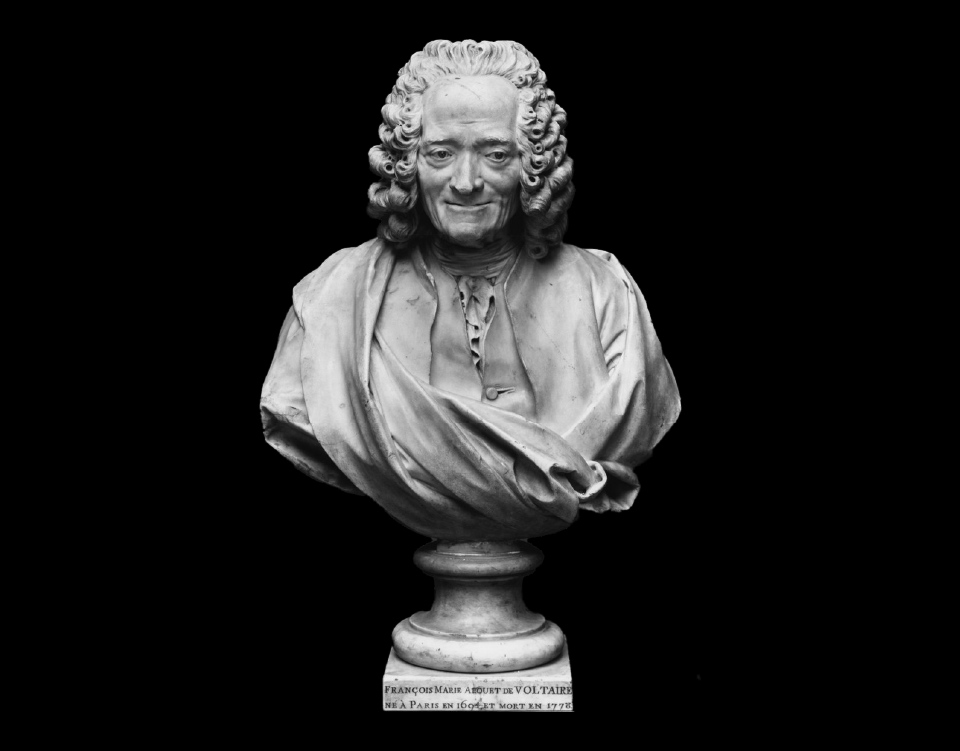
Library of Voltaire
As many will know, Voltaire’s personal library, as it was after the writer’s death, was transferred practically in its entirety to St Petersburg, where it joined the Imperial collection, which is now part of the holdings of the National Library of Russia (NLR).
Two catalogues of Voltaire’s collections exist: one of the books and another, less developed, for the manuscripts. But for Voltaire himself, there was no clear divide between these types of documents: for him, they were all part of his working library. This database, then, brings together for the first time all the books and manuscripts known to have been in that library – although as far as the manuscripts go, we ultimately decided to include only items by other people, since Voltaire’s own drafts were not part of his ‘library’ in the same way (for Voltaire’s own manuscripts, visit the Catalogue of Manuscripts).

“Je ne peux vivre sans livres. Une campagne sans eux serait pour moi une prison”.

Status Fields
Alongside the manuscripts that currently reside in the Voltaire collection in the National Library of Russia, we have included those that are known to have been part of it but for various historical reasons were separated from the main collection, whether because Voltaire himself gave them away as gifts, or because they were integrated into other collections as a result of internal reorganisations within the National Library of Russia.
These different cases have been recorded in the database in the ‘Status’ field. There are five types of status, which can help users to narrow their searches:
• Items that were in the library in Voltaire’s lifetime and remain part of the collection to this day
• Items not in the Voltaire Library today, but where evidence points to them having belonged to Voltaire in the past
• Items containing writing in Voltaire’s hand, but where evidence points to it having been annotated or dedicated with a view to being given away
• Items for which inconclusive evidence suggests that they may once have been part of Voltaire’s library
• Items included in the printed catalogue of Voltaire’s library in error; nevertheless, because these have ‘BV’ numbers, they have been included here.
Classifications
This database contains records of each of the works and documents that Voltaire owned or that is known to have passed through his hands, giving standard bibliographical information and subject classifications. The latter derive from the Catalogue des livres de la bibliothèque de feu M. le duc de La Vallière (1783). At first we tried using the categories adopted by the FBTEE project, but these, based on the output of the Société Typographique de Neuchâtel, were found to be insufficiently literary to reflect Voltaire’s collection, and that of the La Vallière library seemed preferable.
The judgements made regarding the classifications have in many cases been made on the basis of the title alone, and will therefore not be perfect. Users are invited to let us know of any deficiencies to be corrected.
Pots-pourris and Collections
Another innovation of this database concerns Voltaire’s personal collective volumes, known as his ‘pots-pourris’, which collected multiple items, both print and manuscript, into bound volumes. By allocating item records into virtual ‘collections’, the present resource allows users to click through from a single work that Voltaire had bound into a ‘pot-pourri’ to the larger collection to view the other items bound alongside it. Particular thanks here go to Joana Roqué Pesquer for her work on the ‘pots-pourris’, which has made it possible to display the contents of each in the right order.
This open-access resource will ultimately link to Oxford University Voltaire. The indications regarding the presence of marginalia, currently a yes/no field in the database, will eventually turn into hyperlinks taking users straight to the transcription of the relevant marginalia. We hope to carry on enriching this resource in future, for example potentially linking to places in his writings in which Voltaire made use of a particular book in his library.

Library of Voltaire User’s Guide
The database user interface is designed to be intuitive and allows for searches as well as browsing through our Discovery tree. What follows is a brief overview of decisions that were made in how to present the information.
Titles and Authorship
Titles of works have not been modernised, but information about authorship has been updated in line with records in the catalogue of the Bibliothèque nationale de France. Searches can be carried out using accented characters, but searching without them will yield the same results.
Catalogue Numbers
Users who know the print catalogue number (‘BV’ number) of a particular book can search for it, except that we have added zeroes to make them all uniformly 4-digit (e.g. BV12 becomes BV0012) to ensure that they will display in the right order when sorted by BV number.
Some of the BV numbers in this database have extra numbers appended to them: this happens when multiple copies of a single work exist in Voltaire’s library. It was necessary to distinguish between individual copies for the purposes of reconstructing the ‘pots-pourris’, since different copies could be bound in different ‘pots-pourris’. These numbers, added to the BV number after a hyphen, are our invention and do not in any way reflect the printed catalogue from which the BV numbers themselves derive.
Source Numbers
As mentioned above in the general presentation, the material in this database comes mainly from the library in St Petersburg, but it has been extended to include books conserved elsewhere that are known to contain marginalia by Voltaire, or known otherwise to have belonged to him. In each case a record is based on a specific concrete copy of a book, or a manuscript. Just as ‘BV’ numbers are used to identify books inventoried in that catalogue, other source numbers are attributed as follows (see ‘Acknowledgements and sources’ below for full bibliographical details):
• AM: Annexes manuscrites (in the BV catalogue, p.1011-24)
• SK: books identified in the holdings of the NLR by Sergei Korolev in OCV, vol.144B
• OCV145: books held outside the NLR containing marginalia by Voltaire as published in OCV, vol.145
• 999: five titles known from other sources (and which contain no marginalia)
• Caussy: manuscripts in Voltaire’s library
Additional Notes
Much of the added value of the database comes from the way in which items link to each other. It can be navigated by clicking on contributors (authors, translators, publishers, etc.), classifications and collections.
For now, the notes field largely reflects information found in the ‘BV’ print catalogue, but not solely.
The database contains information about false imprints (place, publisher and date) where applicable, as well as the real publication details, where known. Filtering or searching by date will take into account the real publication dates, which can sometimes be a range.
Acknowledgements and Sources
This database has been created in collaboration with ObTIC (Sorbonne) and StalTech Europe Ltd. The Voltaire Foundation is grateful to the John Fell Fund (University of Oxford) for a grant in support of this project, and to Natalia Speranskaya, head of the Voltaire Library at the National Library of Russia, for her help in answering our queries.
The main sources are:
Библиотека Вольтера: каталог книг [Voltaire’s Library: catalogue of books], ed. M. P. Alekseev and T. N. Kopreeva (Moscow, USSR Academy of Sciences, 1961)
Sergei Korolev, ‘Liste détaillée des livres de Voltaire conservés à Saint-Pétersbourg, en dehors de sa bibliothèque’ in Œuvres complètes de Voltaire, vol.144B (2018), p.695-739
Gillian Pink et al., Notes et écrits marginaux conservés hors de la Bibliothèque nationale de Russie in Œuvres complètes de Voltaire, vol.145 (2019)
Fernand Caussy, Inventaire des manuscrits de la bibliothèque de Voltaire (Paris, 1913; repr. Geneva, Slatkine, 1970)
Credits:
General Editor
Gillian Pink (Voltaire Foundation)
Technical Editor
Joana Roqué Pesquer (MSc student in Digital Scholarship, University of Oxford)
Technical Consultant & Developer
Piero Stallo (StalTech Europe Ltd)
Digital Consultant
Glenn Roe (University of Oxford)
Research Assistants
Stephen Ashworth (Voltaire Foundation)
Aušra Bukniute (MA student, University of Oxford)
